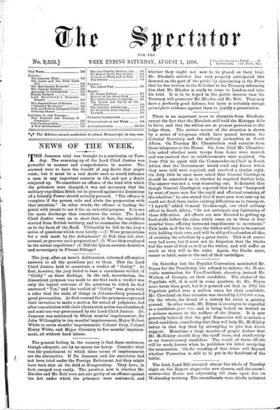There is no important news to chronicle from Rhodesia. except
the fact that the Matabele still hold the Matoppo hills in forge, and that the whites are at present powerless to dis- lodge them. The serious nature of the situation is shown by a series of telegrams which have passed between the Colonial Secretary and the military authorities in South Africa. On Tuesday Mr. Chamberlain read extracts from these telegrams to the House. On June 22nd Mr. Chamber- lain asked whether more troops from home were wanted, and was assured that no reinforcements were required. On Jane 29th he again told the Commander-in-Chief in South Africa that the Government would send any forces which they were told were required, and received a similar reply. On July 24th be once more asked that General Carrington should be consulted as to whether he required further help. The answer was not a very reassuring one. It declared that though General Carrington reported that he was "hampered by want of more men for the rapid and effectual crushing of the rebellion," he also stated that if more men were sent up he could not feed them under existing difficulties as to transport. "I myself," added General Goodenough, our chief military officer in South Africa, "do not anticipate any lightening of those difficulties. All efforts are now directed to getting up food-stuffs before the rains, which come on in three or four months' time, offering increased impediments to movement." This looks as if for the time the whites will have to be content with holding their own, and will be obliged to abandon all idea of crushing the rebellion by a great battle. This is of course very bad news, but it must not be forgotten that the blacks feel the want of food as well as the whites, and will suffer as much as they will in the rains. Again, the blacks must, sooner or later, come to the end of their cartridges.


































